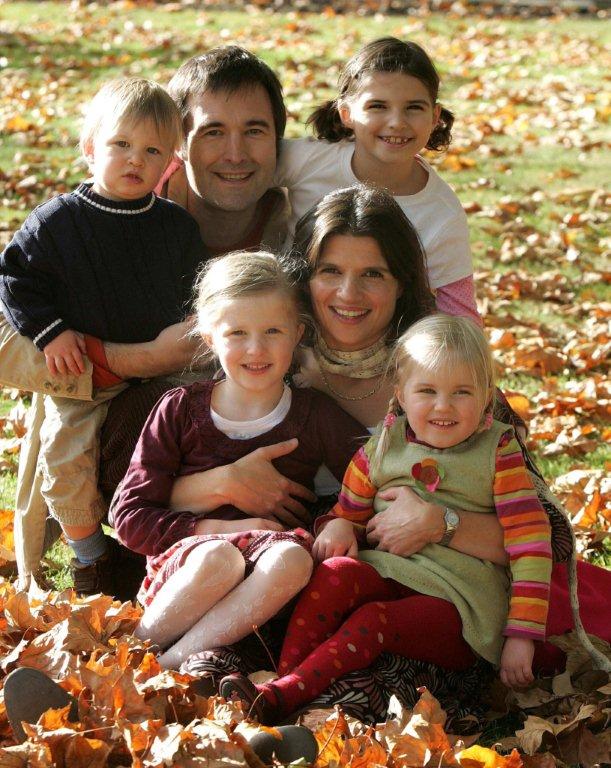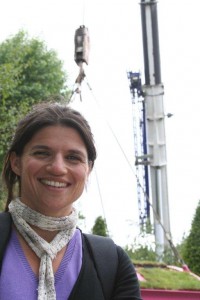5 minutes with Natalie Barb… Director / AP on Flexible Working in TV
April 5, 2013 @ 9:52 am Posted in News CommentsWithin three days of going freelance in 2008 I was offered a brilliant job, writes Director / Producer / AP Natalie Barb. The rate was right, the credit was one level up from where I had been before. Amazing, right? So lucky, so soon. But I turned the opportunity down. Why? Because I had kids – I didn’t think I could make it work.
It’s an easy thing to do. Working in TV, full or part-time can often seem impossible when you have small children, especially when you are freelance and not going back to a staff job. But I am blogging today to tell you it can be done. I wish back then someone had told me the same. My journey to realisation was a slow one but since having kids (and I now have four) I have had some fantastic jobs. They’ve all had different types of work pattern, some more successful than others. You can have a TV career and kids, but you need support – at home and at work.
Four days spread over Five… Here’s a work pattern I made earlier.
My first crack at part-time work was, I thought, a stroke of genius – four days work spread over five while I worked on Blue Peter on the Studio Team and then at Forward Planning. At this stage I was staff at the BBC, so negotiating the hours was relatively easy. Unless I were joining a team that knew me well, I don’t know how easy it would be to swing this arrangement. Still, no harm in asking, right?
THE HOURS:
Officially: 28 per week spread over 5 days,
In reality: more than 28 hours in the office and some picking up in the evenings at home.
THE CHILDCARE:
school 08:15 – 3:30
nursery 08:00 – 13:30
Nanny 13:30 – 18:00 (and one day a week to 19:00)
The days were full on. I’d get up, dress the kids, give them breakfast, take them to school, then leap on my bicycle to get to work. I’d then work flat out from 9:00 to 4:00 (except on the studio day.) During this time I was doing things like organising a pantomime Dame Christmas Pudding race around the “Doughnut” at TVC, arranging interviews with A-listers like Madonna, setting up an identity parade of micro-chipped ginger kittens to make sure we knew which was the latest Blue Peter pet and following my cooking passion by thinking up plenty of “bakes”. Phew!! I’d say I was doing the equivalent of a full-time job. But as close to 4pm as I could manage I would rush off home again to pick up from my nanny who would have collected the kids from nursery and school. So pretty much straight after leaving the office, I was on full-time mummy jobs.
The plus side of this type of work pattern was that I was in the office every day. My day-off was not interrupted by lots of calls. (Murphy’s Law for part-time workers: contributors will always call back when you are not in the office.) But people did still call after 4pm and people invariably called meetings for 5pm so I was always being briefed after the event on changes and decisions that had been made. But from the point of view of my employers, the regular hours for Blue Peter and production team structure meant that this pattern of part-time work was fine for them (as long as I got the work done, which I did).
On the home front, my kids saw me every day. I got to give them tea and bath and a bedtime story. I certainly was working more than the official 28 hours, but full-timers don’t do 35 hours a week either and I felt my extra hours were in proportion. With no travel and regular work hours, I knew my nanny’s hours were under control – support at home sorted. But man, I worked hard to make sure my nanny was not kept waiting. As a consequence I never had a second to myself and in retrospect I realise I was working on half empty. My advice from my present self to my past self – let the nanny (or whoever is helping you at home) do more. Rushing home and immediately taking the reins, and trying to do so much at home is tough. Ask the nanny to stay a little longer, or have dinner ready for you to put in the oven when you come home. Really there are people around who can look after your children just as well as you. Take the time to find them. The right person will take a pride in their job, want to work hard and they do get to go home and have a decent rest (unlike most working parents).
Truly part-time work. 3 days a week hours to suit you.
THE HOURS
Officially: 3 days per week spread over 5 days to suit
In reality: 3 days per week spread over 5 days to suit
THE CHILDCARE:
AD HOC home help (language student with grown up children wanting to earn some extra cash) up to 20 hours cover/week
school 08:15 – 3:30
nursery 08:00 – 13:30
Blue Peter was when I only had 3 children. After baby number 4 and a really tough maternity leave involving long hospital stays for one of my other children, I wanted to ease myself back into work gently. So I did some part-time business development work, production work and pitching for a small independent production company. During this time I scripted, shot and edited several internet films for English Heritage, and ran a training course at the Museum of London in digital production ending in a downloadable walking tour of London. This work was great and pretty much as flexible as you could get. As long as I did the hours at some point during the week, and my work was good, my very understanding employer was happy. I really enjoyed this time, and had the ultimate work life balance. Working three days a week I felt I had time to myself as well as time to look after the children. To be honest, I could have done it all without a nanny, but I had learned the lesson that it’s better to get help if you can afford it – a calmer, more relaxed Mum is a better one in my book.
This work pattern is to be recommended, but these jobs are really hard to come by and I certainly think that on a larger, more full-on production I would feel left out and not part of the team. And in fact some great jobs that would involve full-time work turned up and I was not considered for them, because I was a part-timer. This work particularly worked well because often there were only two of us in the office. BUT the work was, at times bitty, could feel quite solitary and disjointed and it was only when I took on my next job that I realised for me what the short comings of part-time work were. A part-time job felt like a hobby, and not a dynamic career. I think my employer felt that was my view also. It was time to take on some challenges.
Full-time work. “Have you got kids? Did you say 4?? How do you cope?” Cue very surprised face……from work colleagues.
THE HOURS
Full-time and then some.
THE CHILDCARE:
Live-in nanny.
school 08:15 – 3:30
I was going to write about the job, but just writing “live-in nanny” makes me want to say: OMG (that’s not something I normally say, so please imagine the strength of sentiment here) if you have live-in help, the world is your oyster. Not just for work, but you get a social life too. My life was revolutionised when I had a live-in nanny. By now I had learned to really trust your nanny do be able to do all the jobs you do just fine.
It was luck really, an old colleague rang me and asked if I would be interested in a full-time short contract (9 weeks) P/D job on the Chelsea Flower Show. The work involved making insert VTs for the live programmes both prior to the event week and then at the event itself. At this time my husband was away from home Monday to Friday, and the production office was in Birmingham. (I lived in North London). So here’s where I say, you really can make it work. I imagine most people are sensible enough to work in the town where they live and have partners that are at home during the week as well as weekends.
The only way I could do it was by getting a live-in nanny. I found that my costs didn’t go up that much, I didn’t have to stress about what time I was getting home, and I could even get out in the evenings without having to pay a baby sitter a fortune. I was also really pleased to find that having someone live in the house with us was not a huge intrusion on our privacy. During the week I was mostly out, and when I came home the nanny would be pleased for peace and quiet in her own space, and at weekends, the nanny would be away. It is a case of working really hard to find the right person and being clear on the ground rules from the start.
Before you gasp at the thought of me abandoning the home for 50+ hours a week, I still negotiated working from home some days (scripting and logging days). I could also travel from home to shoots rather than having to go to Birmingham first and I worked with the PM to try and secure the Southern UK shoots. On the work front, what a revelation it was to come back to full-time work and get stuck in. I absolutely loved it. I’ve made some really beautiful films of which I am very proud. With Chelsea comes some fantastic talent to work with – both presenters and celebrities. And with the live events, I’ve had that great buzz of turning around a film that I started at 9am and is on-air by 12.
As for me, I stopped being someone’s mother and was myself again. Some people didn’t even know I had kids (perhaps they thought those pictures on my desk were my own and I was an avant-garde naive style dinosaur artist). Yes, my kids missed me and were always so glad that it was a work from home day and I could walk them in to school, or pick them up. But structuring part-time work in this way, is for me, the way forward. I budget for part-time work across the year, but now I do months on and months off rather than days on and days off. That way I spend school holidays with the children when childcare costs can rocket to cover full-time work. It’s no fun having to find nannies for short contracts, but I’ve done it and have always found great childcare. I’ve done it for three years now: Flower Shows and Gardeners’ World with a tiny bit of Royal Wedding thrown in for variety, every year stepping up the amount I have worked. I haven’t looked back and I’m now working to diversify away from gardening and the BBC (any tips on how to achieve that would be happily received).
Before motherhood I spent years working so hard on my career, and I couldn’t bear throwing away all my efforts to just be on the periphery of the action, or not in the action at all. I’m also aware that my children will not be with me forever, and when they have flown the nest, I don’t want to be found floundering wondering what I will do with my time.
Biting the bullet and just going for it, no longer saying no to great jobs, but finding a way to make them work for me has been a success. That’s a qualified success, it comes with exhaustion, compromise, and guilt (I am still haunted by my daughter’s tears when once I didn’t watch her special assembly), but for me working and pushing the limits has been much better than the alternative of staying home and wondering “what if”?
Natalie Barb can be contacted through the TALENT section of www.mediaparents.co.uk or you are welcome to leave comments or questions for her below.
http://www.mediaparents.co.uk/freelancers/868/natalie-barb





Dear Natalie,
Great post. What a great story that is!
I am also a mother and a freelance filmmaker who became fascinated by stories of working parents.
I wonder if you would consider to discuss a transmedia project that I’ve been developing in partnership with other organizations in London. The project Fragments of Parenthood focuses on exploring the impact of parenthood on mothers and fathers of the 21st century. It is about parents sharing stories about their lives allowing local knowledge and parenting experiences to go global.
Please let me know if you are interested.
Regards,
Nina Simoes